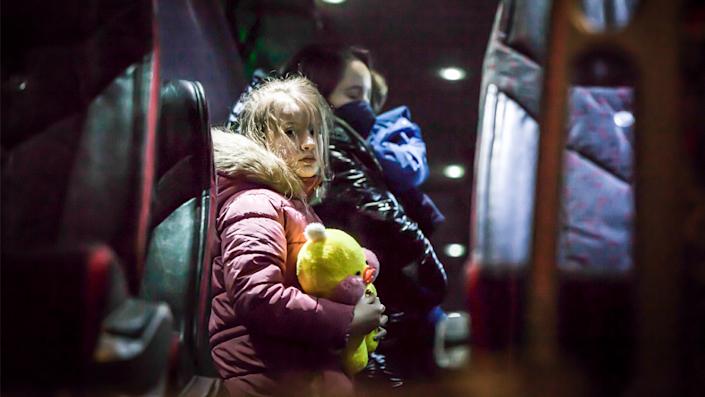Around 660,000 people have fled Ukraine into Poland and other neighboring countries in the wake of Russia’s invasion, the United Nations Refugee Agency (UNHCR) said Tuesday.
That number is sure to increase as the Russian military expands its assault on Ukraine’s cities.
“This figure has been rising exponentially, hour after hour, literally, since Thursday,” said U.N. High Commissioner Filippo Grandi during a Monday meeting of the Security Council. “I have worked in refugee crises for almost 40 years, and I have rarely seen such an incredibly fast-rising exodus of people. The largest, surely, within Europe since the Balkan wars.”
Shelly Culbertson, senior researcher and an expert on forced displacement at RAND Corporation, a nonprofit think tank, told Yahoo News she is worried that as the number of refugees increases to millions, European countries are not prepared to provide long-term services like housing, food and health care.
“If this situation is similar to other situations, the vast majority of people who are fleeing today are probably not going to go home,” she said. “This could be a new sort of permanent population of Ukrainians within Europe, and a long-term population has different needs. They need to integrate into a new community. They need to become self-sufficient and get jobs. Their kids need to get into school.”
The European Union on Monday announced it was preparing to grant Ukrainians who flee the war the right to stay and work in the 27-nation bloc for up to three years. In addition, senior European officials have said that EU border states would get help to cope with the arrivals.
In the past days, checkpoints at various border crossings in Poland, Hungary, Slovakia, Romania and Moldova have been overwhelmed due to the long lines of cars and buses filled with Ukrainians fleeing war and seeking safety. Other refugees, many of them women and children, have braved freezing temperatures and have been arriving on foot, some with their pets and a few possessions. Meanwhile, Ukraine has encouraged all civilians to join the war and has banned most men ages 18 to 60 from leaving the country.
Poland has been one of the most important points of entry for Ukrainians fleeing the devastation. The EU country shares a large border with Ukraine and already is home to a large Ukrainian community.
As of Monday, 280,000 Ukrainians had arrived in Poland, according to UNHCR. That figure, Grandi told the U.N. Security Council, is expected to quickly increase. “I’m seriously concerned about the likely and further escalation in the number of arrivals. … We may have just seen the beginning,” Grandi said, adding that they are planning for up to 4 million refugees in the coming days and weeks.
So far, these European nations receiving refugees from Ukraine have been able to process and accommodate the high volume of people arriving at their borders. There has been an outpouring of support from both governments and ordinary citizens who have come together to help their Ukrainian neighbors. Many have opened their own homes to accommodate the new arrivals, while others have volunteered to drive these refugees from the border to shelters. However, experts worry that unless there’s an immediate halt to the conflict, such a rapid increase of refugees will yield significant policy challenges for the countries receiving them.
“There’s a fair amount of preparation and logistics that have happened. It seems so far that’s been fairly orderly and within levels of capacity,” Culbertson said.
Culbertson says it is crucial that these host countries and the international community begin preparing for a long-term plan to resettle these refugees. According to a study conducted by her nonprofit, only 30 percent of refugees on average have returned to their home countries within 10 years after a conflict’s end.
Another growing concern in recent days is the increasing number of unaccompanied and separated Ukrainian children arriving at neighboring countries’ borders. With parents staying behind to fight for their country’s freedom, these children are especially vulnerable.
“Globally, about half of refugee children are out of school. … There’s a risk that if there isn’t kind of a deliberate process to figure out how to get the kids in school … there could be kind of a lost generation of Ukrainian human capital, if they’re not able to make the transition,” Culbertson said.




